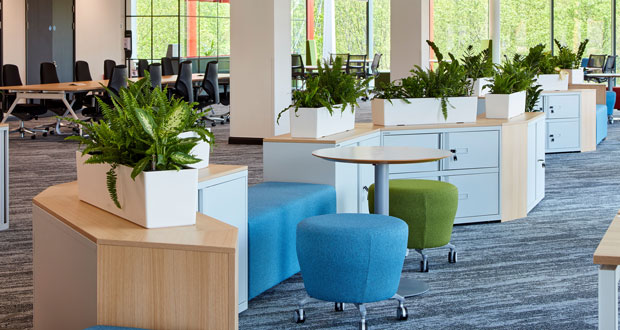Three Welsh Government buildings lead the way in sustainable office fitouts, delivering on the Wellbeing of Future Generations (Wales) Act 2015, while saving taxpayer funds.
The institutions behind these award-winning projects are Transport for Wales, North Wales Police and Public Health Wales – all of whom were recognised for their exceptional sustainability performance in a recent study by the Office Furniture Remanufacturing Association.
All three buildings lead on the Welsh Government’s push for Net Zero by 2025.
Transport for Wales (TfW) Headquarters, Pontypridd
The 68,000ft² TfW headquarters in Pontypridd has been meticulously designed to promote collaboration and innovation among the public, government, and private sectors. Achieving exceptional standards of sustainability and cost-efficiency, this building has earned the Prosperous Future Generations Award 2021 for its exemplary social, environmental, and economic sustainability.
The interior design, conceptualised by Rype Office in collaboration with the Merthyr Tydfil Institute for the Blind (MTIB), exemplifies sustainable practices creating a highly productive, healthy, low carbon and cost-efficient spaces. The building boasts four innovation rooms, a library, town square, casual working zones, flexible public use/enquiry space, external and internal meeting rooms, bike storage, showers, and drying rooms. The Rype Intercept sofa and Rype RePlastic coffee tables, made from post-consumer waste plastic, exemplify the commitment to sustainability.
Biophilia was incorporated into the design from the outset, with plants throughout the building cleaning the air, balancing the humidity and emitting oxygen.
Thirty per cent of the furniture was sourced from two pre-existing TfW offices, 47 per cent was remanufactured, and 16 per cent was made by local manufacturers, reducing greenhouse gas emissions by 90,000 kgCO2e and reusing 31.8 tonnes of furniture. MTIB played a crucial role in the project, manufacturing various furniture items and providing employment for four local long-term unemployed individuals with disabilities.
North Wales Police Eastern Command and Custody Centre, Llay
The 93,400 ft² North Wales Police centre in Llay is hailed as the UK’s greenest police station, reflecting the force’s commitment to the Well-being of Future Generations (Wales) Act 2015.
Eighty-eight per cent of the furniture was refurbished or remanufactured, saving 58 tonnes of CO2e emissions and avoiding 26 tonnes of waste. Furniture was sourced from Wrexham Police Station, Flintshire County Council offices, and local suppliers, supporting local circular economy businesses.
Dr Greg Lavery, Director of Rype Office, describes how this was done: “At the start of this project we put a pin in the map at the new building in Llay and worked outwards looking for furniture sources, upholsterers, powder coaters and carpentry workshops. We found some wonderful suppliers and working with them we were able to keep much of the furniture spend in North Wales, supporting the growth of small local Circular Economy businesses. We will continue working with them on future projects.”
Four local long-term unemployed individuals with disabilities were engaged for the project, providing 1,773 hours of paid employment and training.
The project received multiple awards, including the Constructing Excellence Offsite Project of the Year Award 2018 and the Constructing Excellence Client of the Year Award 2018.
NHS Public Health Wales Cardiff
Bringing together 550 staff from 10 offices into one sustainable building in Cardiff Bay, this project emphasises collaboration, sustainability and value for money.
Ninety-four per cent of the over 2,500 items of furniture were either remanufactured or refurbished, saving around 134 tonnes of CO2e emissions and diverting 41 tonnes of waste from landfill. Some of the refurbished furniture came from PHW’s 10 old offices, integrated seamlessly into the design.
The six per cent new furniture was made in South Wales by local furniture manufacturers including Orangebox, who provided the wingback chairs and team collaboration booths while 13 per cent of the 5,200m2 of carpet tiles were reused. Eight unemployed individuals with disabilities from South Wales were engaged for the project.
The Public Health Wales Cardiff fitout received a flourish of national and international awards for its sustainable and innovative solutions. Awards include:
- Green Apple International Silver Award for Environmental Best Practice
- Constructing Excellence in Wales Award for Value
- Sustain Wales Award for Innovation in Public Services
- HSJ Value Award
- ICLEI Procura+ International Award
- NHS Sustainability Award for Leadership
- NHS Sustainability Award for Procurement
Frontline workers form the backbone of facilities management services, serving as the face of the brand and interacting directly with customers. Yet research by both L&G and the Living Wage Foundation reveals the majority feel overlooked and expendable.
Accelerating the problem is a growing technology gap. Despite having 2.7 billion deskless workers worldwide, representing 80 per cent of the global workforce, only one per cent of software and technology investments has been allocated to this segment. This means there is a huge disconnect between frontline workers and their headquarters, leading to lack of sufficient training, communication challenges and low employee retention.
For this webinar, FMJ has teamed up with frontline training platform Lingio to bring together a panel of experts, to discuss how easy-to-use and efficient AI tools can help create engaging and gamified learning experiences that fit the needs of underserved deskless workers. The result? Better software and learning experiences lead to improved staff engagement and reduced staff turnover by up to 95 per cent, according to McKinsey.
To register for the webinar taking place on 11 September at 11:00 am click here.





